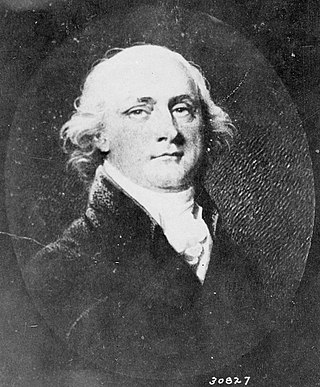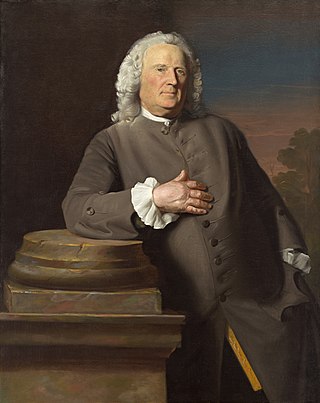Related Research Articles

David Holmes was an American politician in Virginia and Mississippi. He served five terms as a U.S. congressman from Virginia's 2nd congressional district and later was important in Mississippi's development as a state. The federal government appointed him as the fourth and last governor of the Mississippi Territory. In 1817, he was unanimously elected as the first governor of the state of Mississippi. He served a term as U.S. senator from Mississippi, appointed to fill a vacancy until elected by the legislature. Elected again as governor, he was forced to resign early due to ill health. He returned to Virginia in his last years.

The Northwest Territory, also known as the Old Northwest and formally known as the Territory Northwest of the River Ohio, was formed from unorganized western territory of the United States after the American Revolution. Established in 1787 by the Congress of the Confederation through the Northwest Ordinance, it was the nation's first post-colonial organized incorporated territory.

Walter DanielLeake was a judge, U.S. senator, and governor of Mississippi. He served as a United States Senator from Mississippi (1817–1820), as a justice in 1821, and as third Governor of Mississippi (1822–1825). He was the first Governor of Mississippi to die in office.

The Territory of Mississippi was an organized incorporated territory of the United States that was created under an organic act passed by both upper and lower chambers of the Congress of the United States, meeting at the United States Capitol on Capitol Hill, in the federal national capital city of Washington, D.C.. It was approved and signed into law by second President John Adams 1735-1826, served 1797-1801), on April 7, 1798.

The Boston Brahmins, or Boston elite, are members of Boston's historic upper class. From the late 19th century through the mid-20th century, they were often associated with a cultivated New England accent, Harvard University, Anglicanism, and traditional British-American customs and clothing. Descendants of the earliest English colonists are typically considered to be the most representative of the Boston Brahmins. They are considered White Anglo-Saxon Protestants (WASPs).

Winthrop Sargent was an American politician, military officer and writer, who served as Governor of Mississippi Territory from 1798 to 1801, and briefly as acting Adjutant General of the U. S. Army in 1791. He was a member of the Federalist party.

Augustus Emmet Maxwell was an American lawyer and politician. Maxwell served in a number of political positions in the State of Florida including as one of Florida's senators to the Confederate States Congress, Florida Secretary of State, and as Chief Justice of the Florida Supreme Court.

John Francis Mercer was a Founding Father of the United States, politician, lawyer, planter, and slave owner from Virginia and Maryland. An officer during the Revolutionary War, Mercer initially served in the Virginia House of Delegates and then the Maryland State Assembly. As a member of the assembly, he was appointed a delegate from Maryland to the Philadelphia Convention of 1787, where he was a framer of the U.S. Constitution though he left the convention before signing. Mercer was later elected to the U.S. House of Representatives from two different districts in Maryland. In 1801—1803, he served as Maryland's 10th governor.

Samuel Ross Mason, was an American Revolutionary War veteran, Virginia militia captain, justice of the peace, frontier leader, and later, a figure associated with river piracy and highway robbery. He is best known as the leader of the Mason Gang, a notorious group active along the lower Ohio River and Mississippi Rivers in the late 18th and early 19th centuries. Mason is most famously linked to the Cave-in-Rock area, a notorious river pirate stronghold along the Ohio River.

Oscar Turner was an American attorney and politician from Kentucky. A Democrat, he was most notable for his service in the United States House of Representatives from 1899 to 1901.
John Sargent was an American Loyalist during American Revolution who was exiled to Canada where he became a politician.

Paul Dudley Sargent was a privateer and soldier in the Continental Army during the American Revolutionary War.
Hugh Holmes was a Virginia lawyer, politician and judge.

Daniel Sargent Sr. was an American merchant in Gloucester, Massachusetts, and then Boston.
Edward Turner was a state legislator and public official who served as Justice of the Supreme Court of Mississippi from 1824 to 1832, and again from 1840 to 1843.
Daniel Tilton was one of the three first judges of the Mississippi Territory Supreme Court, and the deliverer of the first Territorial Seal of Mississippi.

Colonel Epes Sargent was an American landowner, merchant, politician and military officer from Gloucester, Massachusetts.

Peter Bryan Bruin was a landowner and judge in Mississippi Territory, United States. A veteran of the American Revolutionary War who served as an officer with Daniel Morgan and worked as an aide-de-camp to John Sullivan, he settled in the Natchez District shortly after the conclusion of the American revolution. He was later a host to a young Andrew Jackson and Rachel Donelson Robards, on what may have amounted to their honeymoon circa 1790. In 1798 Bruin was signatory to the "Memorial to Congress by Permanent Committee of the Natchez District," which encouraged the U.S. Congress to annex the Natchez District from Spain and to preserve and extend slavery in the region. After the Mississippi Territory was organized, he was appointed to be a judge by John Adams. Bruin was tangentially connected to Aaron Burr's still-mysterious shenanigans in the lower Mississippi River valley in 1806. In 1808, the Mississippi Territorial Legislature passed a resolution condemning Bruin's conduct on the bench, and delegate George Poindexter requested that the U.S. Congress open an impeachment investigation into Bruin. Bruin resigned his judgeship amidst public charges of alcoholism and dereliction of judicial duty.
References
- 1 2 Farley, Robert J. (1954). "Reviewed Work: Anglo-American Law on the Frontier: Thomas Rodney and His Territorial Cases by William Baskerville Hamilton". Columbia Law Review . 54 (4): 661–663. doi:10.2307/1119561. JSTOR 1119561.
- 1 2 3 4 Rowland, Dunbar (1925). History of Mississippi, the Heart of the South. Vol. 1. S. J. Clarke. pp. 340–341, 362–4.
- 1 2 Tyler, Lyon Gardiner. "William Edward McGuire". Encyclopedia of Virginia Biography. Vol. 4. pp. 343–46. Retrieved April 7, 2022.
- 1 2 Waldrep, Christopher (2018). "Law". Mississippi Encyclopedia . Retrieved April 7, 2022.
- ↑ "From John Adams to United States Senate, 26 June 1798". Founders Online. Retrieved April 7, 2022.
- ↑ Ethridge, William N. Jr. (1967). "An Introduction to Sargent's Code of the Mississippi Territory (1799–1800)". The American Journal of Legal History . 11 (2): 148–151. doi:10.2307/844244. JSTOR 844244.